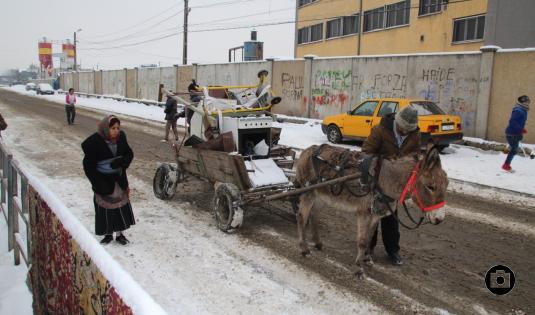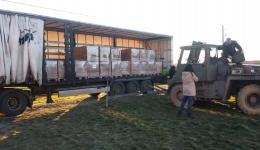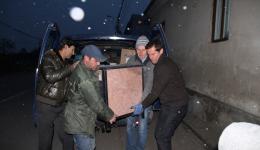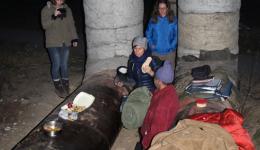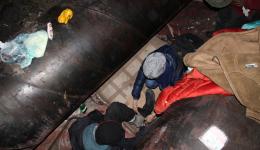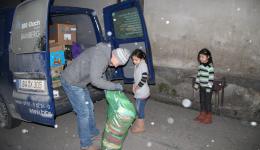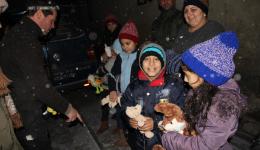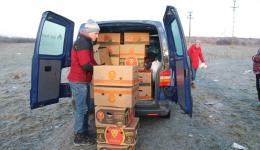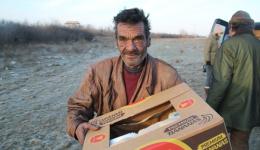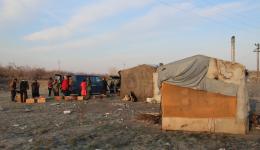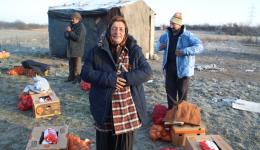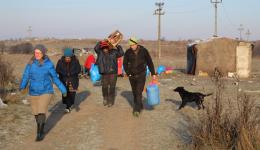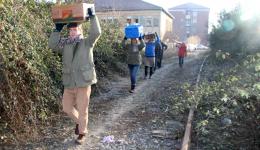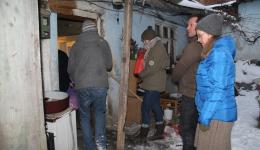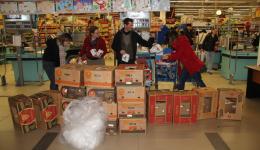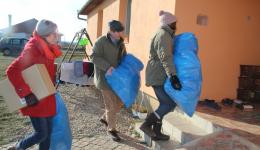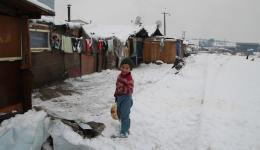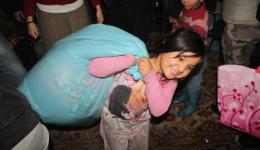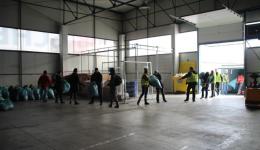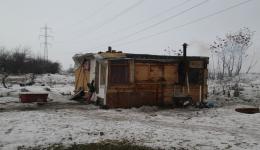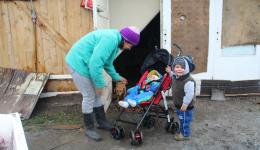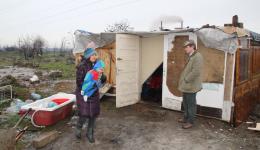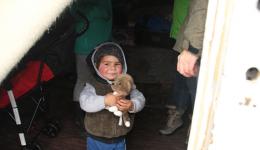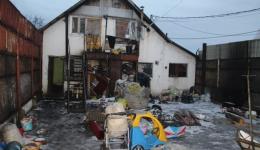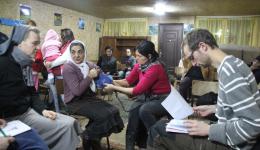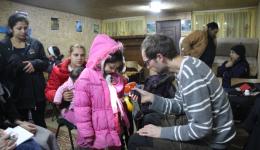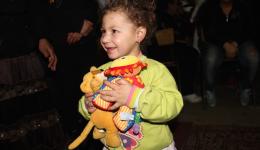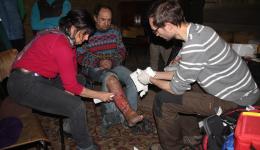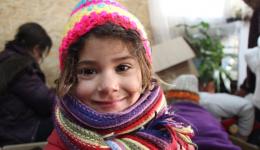Registered Nonprofit
Association for the Support
of Children and Needy
People Around the World
Unterstützung
Romania
Wed, Jan. 27, 2016 - 9:15pm, posted by Frank
Still more new photos in the gallery
Good evening, meanwhile we have uploaded many more photos from the second part of the trip. Besides the distribution of the remaining donations the main focus was the medical care. In the next few days there will be some more photos. With this, the trip report in this journal will be completed.
Sat., Jan. 23, 2016, 8:55am, written by Fenja, Alexandra, uploaded by Frank
Final Report
Dear friends, below you will find the third part of the report which completes the trip to Romania.
In the next two days some more photos will follow which you will find in the gallery.
Bus is stuck
For the next day we plan to take a lot of donated clothing and shoes to Cluj Napoca and distribute as many warm clothes as possible in the gypsy villages (Roma communities). While Fenja continues writing the report and Alexandra is cleansing the house and doing necessary phone calls, Erni, Magarete and Michael begin early in the morning with much enthusiasm to fill the bags and cartons. Box for box is loaded into the bus - which makes that in the end we have to unload and load each time five boxes so that we can sit on the back seat.
Suddenly Erni comes excitedly running to our accommodation and as we follow her we soon realize what the problem is: the minibus got stuck in the mud of the thawed snow. The drive wheels are spinning and cannot get a firm grasp. The weight of the bags and boxes full of jackets, socks, and baby clothes does the rest.
Finally, many children come out of the children’s home, together with Steve, the foster father. They apply gravel before and behind the wheels and help push the minibus. Steve sits behind the wheel and all are pushing with joint forces. Mud is splashing, but we can make it. Dirty but relieved we finally set off on our way to Cluj Napoca.
Three hours later we reach the big university town. We continue to the first Roma village to discuss with the village head Mihai, how we can best cooperate the next few days. Michael is going to offer a basic medical care for all needy people in the area. We discuss a long time with Mihai and finally agree to meet the next day. After a fine dinner we finally go to the hotel – we want to be fit to start the next day.
Basic medical care in Roma community
The next morning we unload some of the boxes, get in the car and again load the boxes. Crammed between jackets and shoes, we close ranks when we pick up Tünde, a friend and nurse who will translate for us today.
Unfortunately there are some difficulties waiting for us in the Roma community: most men are at work as garbage collectors, most children are at school or in kindergarten, and so far we cannot discover any patient. Moreover the allocated premises are still occupied and we have to move in a cold, dark and small room. Nothing seems to have been prepared so that we could start immediately. Together with Mihai we decide to return the following day in the afternoon. This way he has enough time to inform the other inhabitants and to prepare a room.
Without further ado we drive to another community in the parallel street, where we have already gained positive experiences the first time when distributing bags with clothing and potatoes. Unfortunately, Gianny, our contact person is also at work. Therefore we agree to meet in the afternoon. After a joint lunch we say goodbye to Tünde, who unfortunately is only free during daytime. She is a single parent and has to be at home in the evening with her three children. We drive to Pastor Aurel hoping that Sister Gabriela might spontaneously be able to join us tonight and translate. We are happy to hear that the sister is willing to support us in the evening.
When we arrive in the afternoon in Cantonului street in the Roma community, the small room which serves as church, is already warmed up and after drinking tea in his hut with Gianny the village head, we can finally start the medical care.
One after another the patients nicely step forward do listen to the opinion and recommendations of our Doctor Michael. Michael calmly approaches each patient and we patiently listen to the stories of the people, first told in Romanian and then translated into English. Sister Gabi, Erni and Magarete are sitting with each patient in a small circle of chairs taking care of any ailment. Headaches, psoriasis, infected wounds, elephantiasis, cold, pregnancies ... we get a lot to see in the small church.
A 17-year-old pregnant women smiles shyly as she complains about drawing pains in the abdomen. When Michael asks her whether this rather feels like little kicks from the inside she laughs happily and nods – unfortunately not every problem can be solved so easily.
A woman complains of depression, another one is suffering from the white spot syndrome. An elderly woman is depressed telling about weekly attacks by which she often passes out. After a long conversation with Michael and Sister Gabi as translator it becomes clear that she is epileptic. “I must again be strong – for my children” she timidly says. Michael promises that we will provide the appropriate medication.
Teeth are „luxury“
Due to lack of hygiene, hard work and poor nutrition, the demand for painkillers, lice shampoos and vitamins is high. Again and again people complain about toothache and in every mouth at least one tooth is missing. Often the remaining teeth are black, rotten and full of holes. Healthy teeth are a „luxury“ which people here cannot afford.
Whenever Michael asks a patient whether he drinks enough, he vehemently opposes since many think that Michael is talking about alcohol. Nobody wants to be labeled an alcoholic – though we all are aware that there are many here who do have an alcohol problem due to their hopeless situation. They are relieved and laugh when they understand that Michael just recommends everybody to drink enough liquid/water.
At the same time we distribute the donated clothes that we brought along. Jackets, shoes, caps, scarves and sweaters find new owners. Baby clothes are also highly sought-after as many women here have at least five children – which means that virtually there is always a baby in the house.
After Erni has friendly convinced him finally also a very shy elderly man joins our circle of chairs which serves as „treatment room“. We immediately notice his heavily swollen leg. Michael has to cut his jeans and some of us are gasping when we see the wound on his leg. Michael dresses the wound and we are hastily looking for new pants for the man. Luckily we brought along a lot of donated clothing from Germany and soon find a suitable one.
We suggest taking Joseph (which is the name of the man) to Viorel’s homeless shelter in Dumbrava when we learn that the man has no permanent home and there is nobody who can take care of him. Viorel employs a nurse who takes care of all residents and agrees.
However, we cannot convince the man to leave his familiar surroundings – not even with the prospect to get a roof over his head, hot food and medical care. Sister Gabriela tells us that many people here fear such great changes.
Driving to the city late at night, Sister Gabi tells us that she has not been in this Roma community for a long time because she could not bear the hopelessness that often prevails there. Nevertheless, she always again felt a deep need to help the people there. „I am very happy“, she says, „to be able to contribute by translating to alleviate the suffering of these people.“
In the pharmacy we are granted a great discount
The next day starts early for us. We set off to the pharmacy to get the drugs which we have promised to the patients yesterday. Michael and Margarete have a long list of necessary medicines and it takes time until all are found in the correct dosage and quantity. When we explain to the pharmacist the purpose of our “bulk purchase” and show her a Newsletter of FriendCircle WorldHelp, we get a generous discount.
Today we are having lunch very early since we have a full program until late at night. After lunch we pick up Celu and Maria in the gypsy village, for both of them urgently need glasses. The optometrist explains that Maria needs two pair of glasses – one for long distance, another for short distance. Though Maria had already made an eye test she simply had no money to buy the glasses.Also Celu's eyesight is very poor. According to the optician this is innate, but also he could never afford glasses.
Unfortunately in this shop we experience firsthand the discrimination of the gypsy minority as the optometrist tells us in English how reluctantly she serves customers of the Roma communities. We are shocked and leave the shop. The two get their glasses anyway, of course.
„I am not surprised at the reaction of the optician. I am often held for a fool to work with Roma children. Many people here believe that this is a waste of time“, Sister Gabriela tells us later sadly.
Drugs are not affordable for most Roma people
Regarding the lack of glasses, but also concerning most simple, cheap drugs, we realize how different living standards can be: at home in Germany, when the doctor prescribes a drug, we go to a pharmacy and get whatever we need to get healthy.
In view of all the past recipes, however, we can see clearly how many people are lacking the financial resources to buy medicine. In many cases they would have to pay themselves only ca. 5 Euros but their monthly income is not sufficient.
Together with Sister Gabriela we drive back to the community. Also today Michael will hold consultation in the small church. Just like yesterday, there is a great demand and one after another sits down on the chair vis-à-vis Michael.
Soon Erni takes over the blood pressure measuring autonomously while Margarete is busy noting names and medication of patients. Each patient is given a number as well as a paper listing up the respective drugs. This way we can make sure that the following day everyone receives the necessary medicine.
In parallel, we start to distribute clothes, shoes, baby clothes, toys and sleeping bags to the poorest. Especially the brave children who had just been at the doctor are happy about the donated stuffed animals.
Forced to eke a living as garbage collector earning a pittance
A man who is almost deaf, tells us of his pain. Oppressive silence spreads as he mentions that he suffered a mental collapse as one of his six sons was sentenced to prison. Celu tells us that the discrimination by the Romanian population against the Roma often destroys any prospect for these young people. Many did not go to school and can therefore not read or write. „We are forced and doomed to eke out a living as garbage collectors! Now and then a car drives by and the driver shouts: I need three people, hourly wage 1.50€! Then all come running to secure the daily job. Sometimes some see no other option than to steal, to escape the inhuman living conditions at least for a short while.“
Again and again we meet deaf and deaf-mutes and remarkably many people in the community can communicate by means of sign language.
We start with the free „consultation“ always in the evening, because during the day all are underway – most of the adults work for a pittance and some children are at school.
During the five hours that we offer support in the church, the light flickers repeatedly. Fortunately, it never fails completely. A deaf-mute woman makes us signs that they often have no money to pay for the electricity in the small room – the church. Gianny tells us that earlier the police had to come several times to the community. Since they can meet in the church, sing together and pray, the police has to come much less often!
Eight children and two adults in a twelve square meter room
A woman tells us about her sick husband who is in her little hut and has bad pain. She asks to come and help her husband. Michael quickly grabs his equipment and we head to the humble dwelling of the family. In the hut we find the man weakened by the pain and six of his children. Ten of them live in a 12 square meter large room – with us we are now fourteen persons in the hut. With all the medical equipment there is no more space to move. Michael gives the man an infusion for the pain. The sight of the needle makes all feel uneasy, but our doctor continues to do his work unimpressed.The children are happy about our visit and become always more curious. Fenja is filming and shows them the pictures in the camera. Though we do not understand them, they continue babbling cheerfully at us and laugh merrily with us about jokes that either we or they do not understand. After Michael has given final instructions for the night, we walk back to the church.
There Margarete and Erni were meanwhile undisturbed and distributed many donations to the poorest children. They were not allowed to enter the church while the medical consultation was going on. Late at night we leave the community, bring Sister Gabriela home and drive to our hotel.
The next day we again start early in the morning to get more drugs at the pharmacy. Then we drive again to the Roma community. Today, we intend to distribute the missing medicines and take a woman to the orthopedist.
Since it is early in the day, we are friendly greeted by mostly women. Gradually, each patient receives his medication upon presenting the slip. Michael explains each one exactly which medication to take when and how and what improvements should show up soon.
Distribution of remaining donations of clothes and well drilling
We distribute the remaining donations from our friends in Germany and are happy to see the gratitude of many people. We also go to see once more the man with the severe pain, before we finally say goodbye to the people here.
It is difficult for us to understand the circumstances in which these people grow up and their life on the margins of society that has clearly marked all. But all efforts are worth it when we see the grateful look of a woman, the carefree laughter of a child, and feel the friendly handshake of a man.
„Together with you I feel like in a big family“, Sister Gabi says as we sit together in the car, and invites us for lunch in her small apartment where she lives with Sister Helen. and the two now cook Spaghetti with tomato sauce and vegetables for us. We talk a long while and feel sorry to say goodbye to the Sisters because despite the short time spent together we have become good friends.
In the afternoon we set off to Oradea and after a three hours’ drive across the Romanian countryside we arrive at our accommodation. Until late at night we are busy loading the bus for our last day. There are still many donations to distribute, a well to be drilled, and we will also have to say goodbye to all our friends here.
Back in Germany we received a few days later per email the following message from our friend Lili. This message by Lili is actually destined to ALL our friends who have helped realize this action who have lived with us every day, thought with us, worked with us and donated. It was a great action!! THANK YOU ALL for the good time spent together during the preparation of the trip and on the trip .
Dear friends,
I am happy to read that everything went well on your way home...You helped so much our country and our friends! You are such good souls!! If I can help any time, please contact me!!
Just for a feedback: some people you helped are so thankful and happy, you all made them happy! You made them feel that there is a reason to live, you gave them a reason to smile. Thank you for that!!!
With love,
Lili
Wed, Jan. 20,.2016 - 10:00 pm, posted by Frank
Many more photos!
Report no. 3 in preparation
Meanwhile we have uploaded some new photos. The third report including the end of the trip is in preparation and will follow soon.
Many thanks for your kind comments!
Sun, Jan. 17, 2016 - 08:55am, posted by Fenja & Alexandra, uploaded by Frank
Romania - Part 2
Team one traveling home – team two arrives in Oradea
At midnight finally the second team – Michael, Erni and Margarete – reaches our accommodation. The next day we drive 30 km to Viorel’s homeless shelter where we meet him and his family as well as a well drilling expert, who has traveled 150 km together with his wife to discuss with us the planned drilling.
After thorough discussions – translated from Romanian into English, then into German and then vice versa – we agree on the cost of 200 Lei per meter drilling and schedule the drilling start for next Thursday. All other costs, such as travel costs, will be borne by the expert himself as he also wants to contribute to Viorel’s large project. We will go and buy the pump in the next few days together with our friend Liam.
The well in the homeless shelter is urgently needed
As an employee excitedly reports that there is no more water in the third house, we realize how urgently needed a deeper well is. We intend to have the expert drill until the groundwater so that an adequate supply is guaranteed.
As with the first team we visit also with the second team some residents and meet again old friends: three men with intellectual disabilities sing a song for us, the old woman again stretches her arms up thanking God for accommodation – everywhere we are joyfully received. Michael examines a 70 year old woman, whose legs are badly inflamed. She should actually be in hospital but there was simply no room for her and therefore they called Viorel. He then shows us an old chapel which he is just renovating to create room for 17 additional beds.
Visiting other families with gruesome fates
A little later we are back in the car and drive to Oradea to again distribute food and see various families, together with Manu (Viorel’s son). After a quick lunch in a cardboard box we go and get the finished cooked food from Adelina‘s sister and drive to the first dwelling. Again we meet many people with tragic destinies and yet there is great joy about our visit with all of them. At one hut dogs and small children jump around us merrily though a strong wind is blowing almost taking off our caps. Then, in a dark hut a woman smiles at us though she is confined to her bed due to illness. Another woman must share a pair of shoes with her husband and can therefore not come before the hut. A young mother with her three months old baby in her arms is holding her cheek showing us that she has toothache. All are happy about the hot food that Manu brings them every day. We promise to be back soon with clothes and baby stuff.
We continue our drive and visit once more the homeless people between the district heating pipes. Finally, Manu shows us the sleeping place of two men in a building shell – with a sleeping pad and the bare concrete as a roof where the wind relentlessly blows through the empty high-rise building. After Manu and Liam have left, we enthusiastically start sorting clothes as we want to go back to see the families again already tomorrow.
Purchasing well accessories and further food packages
The next morning it’s raining. We start to meet Liam again who will help us to choose the right pump for Viorel. We got to two different hardware stores to compare prices and pump models. Soon we know which pump we will buy. It is designed for 60 m depth and will be able to pump 3000 liters of water per hour to the surface for the 180 residents of the homeless shelter. We also need a valve and a large surge vessel.
Then we go directly into the next big supermarket as we want to bring the families that we visited together with Manu yesterday not only clothing but also packages with food and soap. Among other things, we buy milk, pasta, rice, potatoes, oil, tomato sauce, soap and a couple of chocolate chip cookies for the kids. Already in the supermarket we are looked at with curiosity since we are spreading our boxes right behind the cash register and pack them until they are completely filled up.
Then we finally head to the many needy people. First, we again visit an elderly woman and her daughter. Both of them are completely surprised to see us again but overjoyed to get the two coats, which we hand out to them personally. „Super, super“, the woman repeats and smiles at us. When we then also carry boxes of food into her small dwelling she cannot stop repeating „super, super“. The daughter keeps smiling at us all the time and both are waving at us as we drive to the next family. We drive past a large flock of sheep and up small hill, from where we can look over open fields and see our goal on the horizon, a few small, self-built huts. We honk loudly and then set out to the two huts with our arms full of clothes and food boxes.
There is great joy about the presents
The 3-year-old boy who lives there with his parents and his younger sister and who was so shy the first time now joyfully comes running to us from afar. Several times he is almost slipping on the ice, but fortunately each time one of the adults can catch him. In addition to the things mentioned we also bring a great gift: a stroller. When we arrive at the dwelling, the whole family curiously gathers around the baggy. After dressing the baby into a snowsuit the new stroller is immediately tested. We have to dissuade little Alexander to push his little sister too far into the big field as he is so happy with the gift. He laughs, climbs on the car and gives his sister a kiss. Also in the second hut we hand over a package and bring shoes for two men and a thick sheepskin rug for a bedridden woman suffering of severe hepatitis. We almost cannot find the heart to say goodbye to little Alexander who smiles at everyone so happily, and his parents who are so grateful for everything we have given them.
In the next family we are again overwhelmed by the honest joy of a child. In addition to food and clothing a small boy gets a lovingly packed cardboard box containing clothes, toys, sweets, toiletries such as toothbrush, etc. Each time he grabs something from the box, he shows his finds to his grandfather and makes a little „wow“. The highlight is a pair of shoes that flash at every step. Again and again the small boy stomps on the concrete floor of the hut to have the shoes flash for a few seconds. His grandmother accompanies us to the car and shows us her gratitude with the few words of English she knows. „Thank you“, she once more says to each of us, before she throws a last peck to us and we drive off.
Now we will visit some “old friends”. Some men and a woman live in the immediate vicinity of the district heating pipes. We make a stop and pass on a food package. First there is nobody when we knock on the blue metal door. But shortly after an old man comes running to us. When finally also his wife arrives, he enthusiastically shows her the food boxes we gave him.
Back in the dry bus, we warm up with our warm tea cups and drive on to a slightly dodgy area. Liam tells us that the women here often have to work as prostitutes at night on the main road. We visit a family and bring them clothes and food. Despite their humble abode we notice how tidy everything in this family is. We know that the donated items from our friends in Germany will be in good hands here. Apart from the mother there is only a boy when we arrive and we are moved by his grateful look when we put one of the hand-knitted caps on his head.
We continue to the next family and use the short drives to memorize our experiences because as soon as we open the doors of our minibus and knock on the old doors, we will meet new people with their individual destinies. No history is like the other, each fate that we get to know when we enter foreign huts and unknown rooms is unique.
After lunch with Liam, we go to buy together the pump and the boiler we had selected in the morning and then say goodbye to him. We quickly find new friends: Bridget and her mother. Together with other volunteers the two are organizing activities for children from different backgrounds, sometimes together with the parents. They find it import to integrate very poor families into the social life. The „kids club“ e.g. meets twice a week – consisting of a motley group of children – for playing together, reading, tinkering and having fun. Upon our request they take us to three families who participate in their program. The first family lives in one small dark room located in a rundown house on an old factory site. There is no running water nor electricity. The whole family is covered with soot from the small oven serving as heat source and used for cooking. The children shyly smile at us not understanding exactly what is going on. When we give them a package with toys they slowly gain confidence and are thrilled to try everything together with Michael and Fenja. The father of the family can barely walk, but he walks just a few steps so as to show Michael his health problem. The mother is collecting garbage during the day and sells it in the evening to get some money – maybe 2-5 Euros per day. In addition, they get the child allowance for the two kids which is 18€ per child and month.
When we give some money to the mother, she starts crying
The mother and her two daughters accompany us to the car and we give them some more jackets, shoes and caps. When we give some money to the mother, she starts crying. She says that she feels ashamed to depend on so much help and it takes a lot of persuasion and many hugs until she finally accepts the money. As she wants to write down her name for us, she desperately tries to clean her hands from all the soot and she feels terribly uncomfortable as it does not work. The soot from the furnace makes her face, hands, all her clothes and even her hair appear completely gray. Only the running tears leave a clean track on her face. Deeply touched, we embrace her one last time and then get back into the car.
We make a short call before visiting the next family because we do not dare enter the courtyard in view of the many dogs. The dogs are quickly brought under control and we are kindly requested to come in. We sit down and talk some time with the parents. When we give a pack of glucose to one of the three sons, he is overjoyed and immediately runs into the next room to share this treasure with his brothers. While the youngsters are romping in the next room, the father tells us that he has for a long time been dependent on insecure casual jobs but now finally has found a stable job in a bakery. On 6 days a week he works 12-16 hours for a salary equivalent to about 200 Euro per month. Their biggest problem is the firewood, says the mother, as this is very expensive in Romania. Therefore, they are heating only one room where the whole family sleeps. We give them some money to buy firewood which will last for about one month. Then the mother disappears for some time and we begin to ask ourselves where she may be, when she enters the room with a tray. Although the family lives under such adverse circumstances and has barely enough, she offers all of us a Romanian dessert. We are moved by her hospitality, so we try and are delighted. Soon we say goodbye und after a short drive we reach the next simple home. Bridget tells us that a grandmother lives here with her grandchildren for one of her daughters has died in an accident and the other one is also very poor. However, only one grandchild and the grandmother welcome us as the other children are with their families for there are school holidays. The order and cleanliness of both strikes us positively. The grandmother does not receive a pension, but she could save a bit money when selling some fields. She gets 18 Euros child allowance for her granddaughter, who gets additionally 100 Euros per month as an orphan’s pension. We cannot imagine what it means to take care every day of five children with such a small budget. We ask the grandmother what she likes to cook most and as Bridget translates she smiles modestly and answers that she cooks whatever is in the house. „But we always eat it“, the granddaughter says. Both are always standing close together and we can feel that they have a loving relationship. We give them food and money, which the grandmother accepts hesitantly. When Michael tells her that she is the sun for all her grandchildren, she begins to cry. Immediately the granddaughter jumps up and brings her grandmother a handkerchief. The grandmother hugs Alexandra for a long time and we already consider leaving her here... The old woman laughs and says that she will certainly find a place also for Alexandra. When we tell her that she is an incredibly strong woman, she nods and says that she has to be – for her grandchildren. She just hopes to live long enough until all are old enough to look for themselves.
Working till late night
Outside it has long been dark when we step out of the house again. Thankfully, we say goodbye to our new friends and exchange contacts to cooperate for a next action in Romania.
Today, there is no idea of knocking off work because we have to do still some things. First we meet with Istvan, a friend of Liam’s who brings us to a poor family very close to tour accommodation. Again we are heartily welcomed and we talk a bit with the family. Also here we notice how neatly the apartment is kept. When we tell the woman about our positive impression, she tells that she has a job as a cleaning lady. We are pleased to see how careful she is with her few possessions. Many times we move back and forth between the car and the apartment to bring jackets, children’s clothes, shoes and food. When we leave, she hugs each of us tightly.
Our thoughts are already with today’s last major action when Istvan‘s phone rings. After a brief conversation in Romanian, he asks us in English whether we might have forgotten our camera with the family we last visited. We look around in the bus and in fact cannot find Alexandra’s camera. We quickly turn around and drive back to the small village. The friendly woman is already waiting on the gate and hands us the camera. We are very relieved to have it again and do not know how to thank her. She is overjoyed to have done us a great favor.
Joyful chaos in the home for homeless
Now we can start and meet first Liam and drive with him to the only overnight home in Oradea. The home is designed to host 30 – 40 men and women, plus some emergency shelter places in former shipping containers in wintertime where the homeless can only spend the night. Food is only available, if there have been donations. Therefore, we can meet them only after 8pm. They will spend the night here and be on the road again starting tomorrow morning. A young man asks us if we can image what it means to have nothing to eat during two days. He tells us how he is looking for food in the trash and often finds only very little to eat.
As our arrival is noted, a joyful chaos ensues as all are summoned and gather in the small lounge in the first floor. With the help of many strong men and women we bring jackets, ski pants, socks, scarves and hand-knitted caps of our knitting ladies. We distribute some dextrose which already causes great joy. All want to talk to us, telling their stories with gestures and facial expressions and laughing with us about the many non-verbal jokes that are made the whole evening. Erni and Margarete give each one a colorful cap and on our demand they all put them on. There is a lot of laughing and shouting with enthusiasm about the caps. The joy is visible with all. When it comes to the distribution of the jackets, each jacket is critically checked and it is ensured that everyone receives a jacket that fits properly. The scarves and especially the socks are also very sought-after. A small funny man gets a huge yellow jacket in which he almost disappears. When we offer him a small one, he shakes his head and is enthusiastic about his own huge jacket. He looks like Superman as he picks a dextrose from the packaging and gives it to his girlfriend, also a homeless woman.
Many young women have practical short hairstyles and appear very self-confident – they have learned to survive in a harsh world. The joyful gathering disperses only slowly and by and by everyone disappears into his bed. Some still want to continue talking with us, others proudly show us their sleeping place. We are already sitting in the car when the idea comes up to distribute our newsletter. One by one, we distribute them. Also the people do not understand what is written in the newsletter, they attentively view the pictures and we explain in simple words in which countries we are traveling and where we help.
After a long, eventful day, marked by many people and their destinies, we fall tired into our beds.
Sat, Jan. 9, 2016 - 07:50am, posted and published by Frank
Romania - more photos - photo gallery can be opened by clicking on the large photo above
During the last few days, the team on site continued its intensive work in Cluj and Oradea. Until late night the relief goods were distributed and now also medical assistance was provided. Last night, there was finally Internet connection, so again a few photos could be sent. Next photos and reports will follow ...
In the meantime, the team is preparing for its return trip to Germany. If everything goes smoothly, the team will be back home latest next week-end.
Sat, 09.01.2016 -07:50am, posted by Katrin, Fenja and Alexandra, uploaded by Frank
Romania – Part 1
At 4:00am on January 1st Matthias, Fenja, Bruno and Katrin drive off from nocturnal Bamberg – and arrive at 6:00pm after a 14-hour-journey by minibus at Oradea. Alexandra has already flown in advance on Dec. 28 to complete some necessary organizational matters. We meet her together with our friends Liam and Emma. We have already met the two, an Englishman and his Romanian girlfriend, during our last year’s stay and are happy to see our friends again who are a great help and support for our work in Oradea and the surroundings.
Tomorrow morning we will first visit a homeless home at 30 km distance, which Liam has located a few days ago.
In Romania there are a lot of homeless people and rarely any appropriate institutions to facilitate their lives. In this country with regular sub-zero temperatures in wintertime, a night spent in the open is often life-threatening. Due to the cold in winter, many homeless people who cannot afford a rent or the necessary food are dying on the street.
The institution we are visiting consists of nine different, simple houses, nicely arranged and well-kept. Viorel, the dedicated founder of this institution tells us in his own, simply furnished kitchen while we are having Romanian coffee, about the beginnings of the home and the challenges he is facing in everyday life.
„About 10 years ago I heard in the news that again two people froze to death in the freezing cold. I thought about it and decided spontaneously to evacuate a room in my house and to let two people move in ...“, Viorel tells us. At that time he went to a hospital and asked if he could take two people home. They agreed immediately. A few days later the hospital called to ask whether he could accommodate two more persons. He thought it over and then decided together with his family to close ranks and to remove a wall of a room to accommodate the men.
Viorel knew that people after their treatment in the hospital cannot stay there any longer and have to go back into the cold which for many would mean certain death.
Here in Oradea there is actually an institution for homeless people, however it opens only from 8:00pm to spend the night there. Food is only available if there has been a donation which happens not so very often. Early in the morning, the people must go back on the road to earn some money for food by e.g. collecting rubbish. In the daytime, the home is closed.
Together with his family and 18 employees who receive a small wage, Viorel manages the institution on his own. He is presently accommodating 180 men and women whom he has brought off the street or accommodates when they are leaving the hospital to save them in the first place from freezing and long-term offer them a home if they so wish. Quite a few of them are mentally ill, have alcohol problems are at risk of suicide and have been abandoned by their own family. They would elsewhere not find a shelter or care.
Viorel has big plans. Every year he would like to buy another nearby old house and fix it up together with his sons to accommodate still more people. He is also thinking of how to recruit permanent volunteers and how to help people living on the street in a sustainable way.
He is financing all this and the ongoing institution with the help of donations, mainly from people in the area who have themselves not a big income. For Viorel it is a miracle that the institution has been running for 10 years without people going hungry because of lack of donations.
We take a tour of various rooms of some houses. The residents seem quite happy and grateful to have found a warm place, a bed, food and a community. They are glad to see us since the visit of strangers is a welcome diversion to them.
Many are bedridden; some have no legs because their limbs are frozen outside in the winter and had to be removed. A very slim, slender elderly woman who has lived here for two years, „bedridden“ and unable to get up, raises her hands as she sees us. She says a few words in Romanian which we do not understand. Emma translates: She wants to tell us how infinitely happy she is to be here. During our visit she eats a brown soup from a little plastic pot. Later, Viorel tells us that out of desperation she attempted several times suicide. The destinies touch us very much...
We will give the people here a portion of the donated clothes we brought along, and all are very happy about this.
Viorel also tells us about his worries. For example, the well on the premise has originally been aligned for his own little family. There are no public water lines in this area. In these villages almost every house has its own well and this well of course is not enough to cover the needs for water for all. We decide that FriendCircle WorldHelp will take over the well drilling. Viorel will investigate and look for a company offering the best price for the drilling.
We say goodbye and drive back to Oradea, where Viorel’s son Manu and his girlfriend Adelina show us various places where homeless people live next to and between above-ground district heating pipes. We visited such places already last year. After removing the insulation of the pipes, people live here outdoors in wintertime. Presently the night temperature is minus 10 degrees!
Our new friends Manu and Adelina regularly distribute hot food to the homeless people in the city. Today is Saturday and we will take care of the purchase of food. We buy hot meals and bread rolls in the supermarket and have our new acquaintances lead us to the needy people living in hiding. We are passing on winding roads through deserted terrain over pipes, railway tracks and through the undergrowth.
Everywhere we are received by loud barking dogs living in herds out here and being partly the companions or guardians of the people. First we visit a place where 9 persons live. In addition to the warm food they get thick jackets and sleeping bags and of course the never missing beautiful colored caps of our knitting ladies.
In another place we find a house which is presently empty – no problem, we will be back the next day. The next place is located in an industrial area with a few barracks. Again, the residents get a warm meal, jackets, sleeping bags and warm caps.
In the neighborhood lives a couple between two heating pipes. Alexandra knows them from last year’s visit. The woman is ill, her legs are very thick and she can hardly walk. Also this couple receives a hot meal and warm clothing. All are very grateful and touched by the gifts and the attention we extend to them, since they have the lowest position in society and are living a life as hard as we cannot imagine, without anybody caring for them.
On the road we also meet a garbage collector family with a child in a handcart. We of course equip them with all we have with us. As we pull a pair of booties that fit the boy from our minivan, he smiles at us gratefully.
Our thoughts are still with all we have experienced, when the next item on the list is waiting: the purchase of food packages for various families living outside of Oradea hidden in self-built huts on the field near a garbage dump. We visited these people already last year. We fill 20 banana boxes with staple foods such as rice, pasta, potatoes, bread, butter, oil and some fruit and vegetables.
On our journeys we have learned that it is recommendable to prepare in advance boxes for each family which makes distribution easier.
Since it is already late, we will distribute the boxes the next morning. Late in the evening we visit a family who also lives on the outskirts in very poor conditions. The health of the woman who lives together with her husband and the twelve year old son of a meager salary is very poor. She is suffering from blood cancer and diabetes and cannot afford all necessary drugs. The whole family is very depressed because of the poor health of the mother. When we give them one of our food boxes and a small monetary donation for the medicine, they do not know what to say. With tears in his eyes, the father says that he feels uncomfortable to get so much help. Should we ever come back near his house, we should please visit him again. Maybe he could then do us a favor as well. The man’s modesty touches us very much...
The next day we get up early in the morning and drive to the mentioned field where the inhabitants of the huts gather quickly. They remember us from last year’s visit. We hand them over the boxes with food and distribute warm jackets, sleeping bags, etc. from our friends at home. As we move a bit away from the first huts, we find three small puppies, snuggled together, covered with a light blanket of snow. They froze last night. We can hardly believe that such a cruel death can look so peaceful. Again we realize how dangerous life outdoors is in winter. On a plastic tarp we find another frostbitten puppy.
We also go to see a woman who lives in a nearby poor puny hut. She is suffering from asthma which of course exacerbates in the small narrow rooms heated with combustion. She is constantly coughing and to walk even short distances is a problem for her. As Alexandra had got to know beforehand, her 35 year old son had died of a heart attack last Saturday and she is inconsolable. Again and again she points to her belly meaning her son and then raises her hands to the sky. She gets warm clothes, food and medicine for her asthma. All are very grateful praising God for the gifts received. We promise to come back later as we want to bring also gloves and some donated boots.
Back in our “storehouse” we first sort the contents of the numerous pallets with the precious items. We give part of it to the hostel for homeless of Viorel. We intend to bring a part of the gloves still today to the people we just visited. Later, we will bring further jackets and gloves to another hostel for homeless which we visited already last year.
We give the children’s items right to the children of the orphanage which has provided us the storerooms. When we see how happy the 30 children are about the donated clothing, the shoes, toys and stuffed animals, we realize that such donation is unique for these kids. They apparently very rarely get such gifts which for Germany children are nothing special. „This is much more than Christmas for them“, Liam says. The children proudly present the new jackets, shoes and clothes. They are happily holding soft toys. We have rarely seen children being so happy about toys. A boy catches hold of a donated Bayern-Munich towel – obviously also here German football clubs are appreciated!
Then we continue quickly. After lunch we go back to the people on the field to bring them the gloves which are indispensable in the cold as well as some pants and boots. Also the sick woman with the thick legs living between the district heating piped needs a pair of boots. Since we have none left, Alexandra takes off her own and puts them right on to her – and they fit!
When all textiles are distributed, we say goodbye to Liam and Emma who have become valuable friends of ours. Without the help of local friends and those who translate for us, we would not be able to work successfully!
Now we are heading to Cluj Napoca about 2.5 hours through the mountains. We have already been there last winter to visit several settlements of poor Roma.
After a good breakfast we meet with Emil and some friends from the Caritas. They are going to help us sort out the valuable donations and pack most of them in 200 bags for a Roma Community. Another part is destined for needy families known to Caritas and a kindergarten. We get further help from Cosmin and his daughter Petra a contact which had been established by our friend Emma.
Then, Cosmin, Petra and Emil accompany us to an old, very sick woman and her daughter. Their furnace is completely broken. The woman can barely leave her bed on her own and is suffering great pain. Her 20 year old daughter needs an eye surgery. The small oven does not even warm up the little room where the two live. It is dented and cracked and no longer usable for cooking. Bruno and Matthias take measure so that we can later select the right oven in the hardware store. We have lunch together and Cosmin shows us his office where he is working as a lawyer – and which also serves twice a week as meeting room for a self-help group of alcoholics anonymous. He is also working with Roma children and prison inmates.
Re-invigorated we drive to the hardware store and discuss at length about the right oven. When we reach again the home of the old woman, it has already become dark outside. The entire neighborhood is waiting for us and since there is no electricity, everybody helps with flashlights to bring the oven into the small room. Fortunately, one of the neighbors is willing to install the oven the next day in daylight. We give the family some coals for heating. As it starts snowing outside, we decide to distribute some caps and stuffed animals to the children which they are straight off holding tight.
The next morning we meet with Emil and drive to the wholesale shop to purchase further food parcels which we intend to distribute to various needy families. Today, however, we will first visit another Roma community.
At our arrival, the snow in front of the small church is just being swept away, and we are asked to quickly enter into the warmth. As the 2.4 tons of potatoes are delivered, it does not take long to find some “strong men” who bring the bags into the church in no time.
While we are waiting for the truck with the 200 bags filled with clothes, Celu takes us to some huts of the community. The people here live in poorest conditions, in each room there is at least one family. We meet a boy whose leg had to be amputated after a train accident. He shyly smiles at us. Many children look at us curiously, some even laugh joyfully. We are always friendly invited into the simple rooms, even though we do not all find a place. Back in the church the clothes are stacked and the musicians are rehearsing some of the songs while Alexandra and Fenja dance with some of the children who are first timid, then very enthusiastic. Then finally the numerous people are invited to enter. After Alexandra told them a bit about us and our work, all together are singing and clapping to the music. We feel that the music makes the sorrows of the people move a bit further away for some moments and the joy in their faces touches us very much. Then one after another steps forward to us to receive a bucket full of potatoes and a bag of clothes – lists are ensuring that everyone in the great community gets something. Also a delivery of wood is quickly delivered in front of the church. As we depart, the people keep waving to us for a long time.
After a somewhat late lunch, we visit together with Emil two needy families. They get a big food parcel and some hygiene and cleaning supplies. Later we drive once more to the sick woman for whom we bought the new furnace and have a look at the finished installation. We are pleased to see that the neighbor has done a good job. His family as well as the woman with her daughter also receive a food package.
We enjoy the last evening together as Katrin will start early next morning her way back to Germany.
In the morning of January 6 we meet in the offices of Caritas with Emil and Michael as well as with many needy families from across the city. Alexandra tells about our many friends in Germany who have made all this charity work possible. When she mentions that the true wealth is the love in everyone’s heart, all nod enthusiastically. Each one gets a bag containing food and hygiene items. Then we spread the great quantity of donated clothes on the tables and people can take whatever they need most. All are very modest and some do not really dare take anything. Only after some coaxing does an elderly lady take a beautiful pair of boots. We then find her also a matching scarf and she thanks us with a sincere smile.
Many have come with their husbands or their children because one person alone cannot possibly carry all these valuable things. Some make a note and promise to come and pick up the remaining things later. As all have gone with full bags, suitcases and backpacks, we are left with a smile on our faces.
Later we drive with Emil to another Roma community. Again we visit first some people in their huts. The garbage dump in the neighborhood becomes quickly noticeable by the smell, but also by the great number of balances used to weigh the collected items. Some of the men, women and children of the community find work there and earn a few Euros a day. A widow tells us that she has not enough money to buy firewood – therefore she fires her oven with collected plastic bottles. Many children laugh, but some of the young people barely look up as we enter the room. In their hearts there is so much hopelessness.
While we are still walking from huts to huts, Mihai one of the villagers, sends a girl to round up all children. Soon children come running from everywhere and wait for us to come back to the car.
After all have more or less formed a row, each one gets a cap from our knitting ladies and a packet of biscuits. Shyly they mutter „mujzimask“(thanks), but when Matthias puts them the caps on – one after another - they liven up and rejoice with us. We agree that we will be back with the second team to provide medical care for all communities in the local kindergarten.
Finally we must say goodbye first to our friend Emil and then to Cluj-Napoca as our journey leads us back to Oradea, where Fenja and Alexandra finally also say goodbye to Bruno and Matthias since the two are traveling back to Germany – with much less luggage but many new impressions and experiences.
Wed, 06.01.2016 - 11:15am, posted by Frank
Distribution of donated material in Oradea and Cluj in full swing
The following is a preliminary information on the current distribution of the donations. Unfortunately, our team does not have Internet access at the moment, therefore only a few photos sent via mobile phone are available. More photos and detailed information will follow in the next few days:
The loading of the truck in Bamberg on Dec. 29 went smoothly. On the loading station of the SCHENKER Company the 30 pallets were stored on the big trailer with a forklift. On this occasion, again many thanks to the Company DB SCHENKER for the free transport of the relief goods! Also the packaging material, the pallets and special large boxes were provided free of charge – many thanks to the Company DB SCHENKEReuropac in Coburg :-)
Alexandra had already flown to Romania on Dec. 28 to organize locally in advance a lot of things so that she was already in Cluj Napoca.
On Dec. 30 in the morning the first part of the charge was discharged and stored until distribution. 8 persons consisting of Liam and some friends were on site to do the unloading with a specially organized forklift. In the afternoon the truck could then unload the remaining pallets in Cluj in the freight warehouse of Schenker Romtrans.
In the early hours of New Year’s morning Matthias, Fenja, Bruno and Katrin set off with a minibus to Romania. Together with Alexandra and the local friends they are team one. After some 13 hours’ drive they met with Liam and Alexandra in Oradea.
Since Jan. 2 the distribution is running there and meanwhile large parts of the donations have been distributed to needy people. Currently the team is in Cluj and will return to Oradea on Jan. 7. There they will meet in the evening with the second team. Michael, Fred, Margarete and Erni will arrive with a second car and will continue the distribution action as well as provide medical support.
At home, the collection hall is in the meantime returned to the families Ertl and Schrödel with many thanks.
|
|
